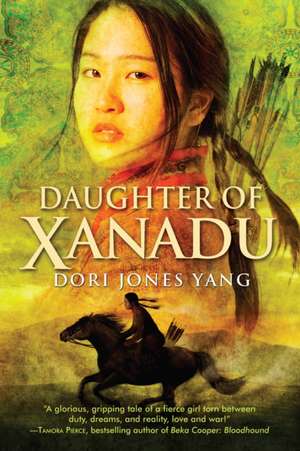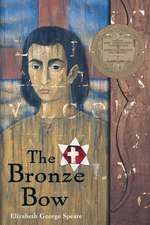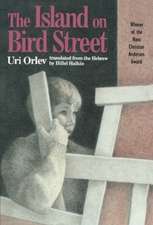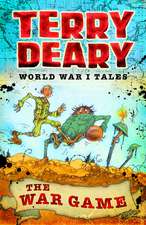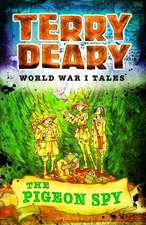Daughter of Xanadu
Autor Dori Jones Yangen Limba Engleză Paperback – 31 dec 2011 – vârsta de la 12 până la 17 ani
From the Hardcover edition.
Preț: 88.25 lei
Nou
Puncte Express: 132
Preț estimativ în valută:
16.89€ • 17.68$ • 14.01£
16.89€ • 17.68$ • 14.01£
Carte disponibilă
Livrare economică 19 martie-02 aprilie
Preluare comenzi: 021 569.72.76
Specificații
ISBN-13: 9780385739245
ISBN-10: 0385739249
Pagini: 352
Dimensiuni: 137 x 206 x 18 mm
Greutate: 0.27 kg
Editura: Ember
ISBN-10: 0385739249
Pagini: 352
Dimensiuni: 137 x 206 x 18 mm
Greutate: 0.27 kg
Editura: Ember
Notă biografică
Fluent in Mandarin, DORI JONES YANG was a foreign correspondent in China for Business Week. She also wrote a business book about Starbucks Coffee Company. She and her family have traveled to Mongolia and visited the site of Xanadu, now in ruins, and the site of Khubilai Khan's palace at Khanbalik, which is now the Forbidden City in Beijing.
From the Hardcover edition.
From the Hardcover edition.
Extras
1
A Taste of Victory
The fierce Mongol army was riding straight at us.
My cousin Suren and I stood on the balcony of the palace gate, scanning the horizon, our hands on the marble balustrade. In the far distance, on the plain outside the city's south gate, a massive cloud of dust hid the mighty force, advancing toward the city. The sky shone vivid blue on this late-spring day. A cool wind whipped the loose hairs around my face but could not lift the heavy braids on my back.
I leaned over the marble barrier and squinted.
The Mongol army was about to enter my home city, Khanbalik--not to attack us, but for a grand victory parade. I was fifteen, nearly sixteen, the eldest granddaughter of the powerful emperor Khubilai Khan. My blood pounded in my ears, and I could barely stand still.
Finally, my sharp eyes detected the glint of metal armor and the first few horses of the parade as they emerged from the dark arch of the city's south gate. "Look! Is that the general?" I said to my cousin. Suren was the Khan's eldest grandson and my closest friend. His thick neck stretched out like a turtle's as he strained to see, too.
A huge roar of approval rose from the crowds lining the streets, confirming my guess. Shouts of joy echoed from the rest of the royal family, surrounding me on the palace balcony. "Hooray! Hooray!"
I cheered more loudly than anyone else. Victory tasted sweet.
Suren raised his fist high as he yelled. His wide face with its high cheekbones glowed with happiness. In his veins, Suren had a drop of my blood, and I had a drop of his flowing inside me. At the age of ten, we had decided to become anda, cutting our fingers and mingling our blood, promising lifelong loyalty, like blood brothers. Now, five years later, we were inseparable.
Suren pointed to the parade. "Emmajin!" he said. "Is that an elephant?"
I leaned forward and focused on the distant archway. Sure enough, a massive gray creature was entering the city, the carriage on its back nearly hitting the top of the arch. We had heard of these beasts but never seen one. "It's twice as tall as a horse!" I said.
"No, three times as tall!"
The general led the army up the broad main avenue of Khanbalik, the Khan's capital, a city known to the local Chinese as Dadu, or the Great Capital. The soldiers rode in neat formation directly toward the palace gate where we stood. I felt the tromp of their horses' hooves vibrating in my body, and I smelled the grit and the sweat in the wind.
These brave soldiers had broken the long siege of a large city in the South, finally conquering it. This victory opened the way for our armies to march toward Kinsay, the capital of southern China. Many battles lay ahead, but now it seemed inevitable that the great Mongol army would eventually control all of China. No one could stop us now.
This general, the famous Bayan, was returning to his Emperor, the Great Khan Khubilai, to get his reward for breaking the siege and winning this historic victory.
Not far from Suren and me, just beyond a clutch of princes and wives and retainers, the Khan of all Khans sat on a raised platform. His massive body was draped in white brocade edged with the finest furs, white with black spots, from snow leopards. His face, wide and normally impassive, seemed to glow in the late-afternoon sunlight. His feet rested on thick embroidered cushions.
On that day, we all wore white, the color of good luck and victory. I had borrowed a silk robe from my mother, because I had grown taller since the last big celebration. I craned my neck until I caught sight of my father, Prince Dorji. As the Great Khan's eldest son, he stood by his side, the first in a row of many sons of the Khan's four official wives. I felt a pang of joy. My father seldom claimed his rightful place at the Khan's side.
Although my father was the eldest, the Khan bestowed his favor on his second son, Chimkin, Suren's father. Chimkin had led armies, fought in battles, and won the respect of all at court. Instead of fighting, my father had run away to a Buddhist monastery. He walked with a limp, dragging one foot. Some of my cousins mocked him.
Suddenly, I felt like running. "Let's go!" I said to Suren. I pulled back from the balustrade and pushed my way through the crowd of onlookers.
"Wait! Slow down!" Though no longer pudgy, as he had been as a boy, Suren was broad-shouldered and sturdy, not able to slip through the crowd as quickly as I could.
I headed for the steps and raced down them two by two. From the high balcony platform above the gate, the staircase curved around down the inside of a stone tower. Suren stumbled after me, his voice echoing in the empty tower. "Emmajin! Where are you going?" Unlike me, Suren never acted on impulse.
Across the courtyard and through the thick tunnel that was a front gate of the palace compound, I ran. I had always loved the most physical of activities: running fast, racing on horseback, practicing archery for hours on end until my arm muscles bulged. Even though I was a girl, I had built up my skills at all three Mongolian "manly arts": horseracing, archery, and even wrestling, the one sport reserved for men only. I loved to compete with Suren and my other boy cousins, the young princes.
In the square in front of the Khan's palace, crowds were jostling, and soldiers rammed them back, to keep the center of the square clear. With Suren trailing behind me, I dashed across the square toward the main avenue. Onlookers buzzed with jubilation, shouting and pointing as the horses, elephants, and soldiers advanced down the avenue toward us.
From the Hardcover edition.
A Taste of Victory
The fierce Mongol army was riding straight at us.
My cousin Suren and I stood on the balcony of the palace gate, scanning the horizon, our hands on the marble balustrade. In the far distance, on the plain outside the city's south gate, a massive cloud of dust hid the mighty force, advancing toward the city. The sky shone vivid blue on this late-spring day. A cool wind whipped the loose hairs around my face but could not lift the heavy braids on my back.
I leaned over the marble barrier and squinted.
The Mongol army was about to enter my home city, Khanbalik--not to attack us, but for a grand victory parade. I was fifteen, nearly sixteen, the eldest granddaughter of the powerful emperor Khubilai Khan. My blood pounded in my ears, and I could barely stand still.
Finally, my sharp eyes detected the glint of metal armor and the first few horses of the parade as they emerged from the dark arch of the city's south gate. "Look! Is that the general?" I said to my cousin. Suren was the Khan's eldest grandson and my closest friend. His thick neck stretched out like a turtle's as he strained to see, too.
A huge roar of approval rose from the crowds lining the streets, confirming my guess. Shouts of joy echoed from the rest of the royal family, surrounding me on the palace balcony. "Hooray! Hooray!"
I cheered more loudly than anyone else. Victory tasted sweet.
Suren raised his fist high as he yelled. His wide face with its high cheekbones glowed with happiness. In his veins, Suren had a drop of my blood, and I had a drop of his flowing inside me. At the age of ten, we had decided to become anda, cutting our fingers and mingling our blood, promising lifelong loyalty, like blood brothers. Now, five years later, we were inseparable.
Suren pointed to the parade. "Emmajin!" he said. "Is that an elephant?"
I leaned forward and focused on the distant archway. Sure enough, a massive gray creature was entering the city, the carriage on its back nearly hitting the top of the arch. We had heard of these beasts but never seen one. "It's twice as tall as a horse!" I said.
"No, three times as tall!"
The general led the army up the broad main avenue of Khanbalik, the Khan's capital, a city known to the local Chinese as Dadu, or the Great Capital. The soldiers rode in neat formation directly toward the palace gate where we stood. I felt the tromp of their horses' hooves vibrating in my body, and I smelled the grit and the sweat in the wind.
These brave soldiers had broken the long siege of a large city in the South, finally conquering it. This victory opened the way for our armies to march toward Kinsay, the capital of southern China. Many battles lay ahead, but now it seemed inevitable that the great Mongol army would eventually control all of China. No one could stop us now.
This general, the famous Bayan, was returning to his Emperor, the Great Khan Khubilai, to get his reward for breaking the siege and winning this historic victory.
Not far from Suren and me, just beyond a clutch of princes and wives and retainers, the Khan of all Khans sat on a raised platform. His massive body was draped in white brocade edged with the finest furs, white with black spots, from snow leopards. His face, wide and normally impassive, seemed to glow in the late-afternoon sunlight. His feet rested on thick embroidered cushions.
On that day, we all wore white, the color of good luck and victory. I had borrowed a silk robe from my mother, because I had grown taller since the last big celebration. I craned my neck until I caught sight of my father, Prince Dorji. As the Great Khan's eldest son, he stood by his side, the first in a row of many sons of the Khan's four official wives. I felt a pang of joy. My father seldom claimed his rightful place at the Khan's side.
Although my father was the eldest, the Khan bestowed his favor on his second son, Chimkin, Suren's father. Chimkin had led armies, fought in battles, and won the respect of all at court. Instead of fighting, my father had run away to a Buddhist monastery. He walked with a limp, dragging one foot. Some of my cousins mocked him.
Suddenly, I felt like running. "Let's go!" I said to Suren. I pulled back from the balustrade and pushed my way through the crowd of onlookers.
"Wait! Slow down!" Though no longer pudgy, as he had been as a boy, Suren was broad-shouldered and sturdy, not able to slip through the crowd as quickly as I could.
I headed for the steps and raced down them two by two. From the high balcony platform above the gate, the staircase curved around down the inside of a stone tower. Suren stumbled after me, his voice echoing in the empty tower. "Emmajin! Where are you going?" Unlike me, Suren never acted on impulse.
Across the courtyard and through the thick tunnel that was a front gate of the palace compound, I ran. I had always loved the most physical of activities: running fast, racing on horseback, practicing archery for hours on end until my arm muscles bulged. Even though I was a girl, I had built up my skills at all three Mongolian "manly arts": horseracing, archery, and even wrestling, the one sport reserved for men only. I loved to compete with Suren and my other boy cousins, the young princes.
In the square in front of the Khan's palace, crowds were jostling, and soldiers rammed them back, to keep the center of the square clear. With Suren trailing behind me, I dashed across the square toward the main avenue. Onlookers buzzed with jubilation, shouting and pointing as the horses, elephants, and soldiers advanced down the avenue toward us.
From the Hardcover edition.
